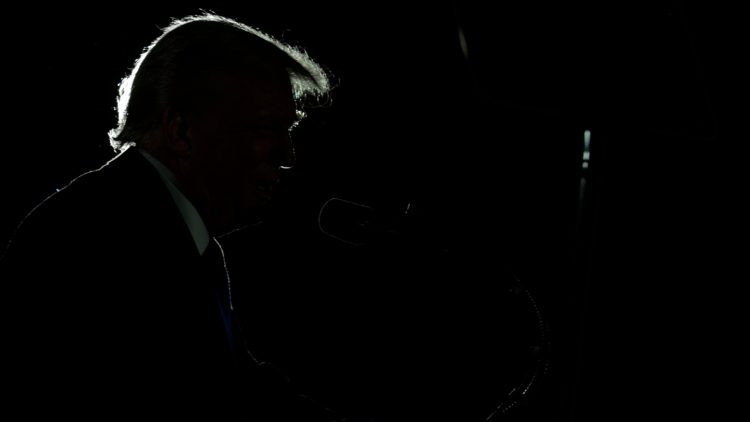Hollywood ought to have seen this coming. After beginning commerce wars over vehicles and metal, photo voltaic panels and washing machines, Donald Trump has added films to the checklist.
POTUS’ announcement on Fact Social on Might 5 that he plans to slap a one hundred pc tariff on movies “coming into our nation produced in overseas lands” has despatched shockwaves by the worldwide leisure business.
The plan — if a 113-word submit, a lot of it written in screaming all-caps and in addition walked again by a White Home spokesperson, may be thought of a plan — seems to be to try to pressure the studios to shoot extra films in America by imposing a levy on tentpoles that shoot overseas, in international locations like Canada, the U.Ok., Spain and Australia, and reap the benefits of native tax incentives there.
Even when such a tariff had been authorized — and there’s some debate about whether or not Trump has the authority to impose such levies — business consultants are baffled as to how, in follow, a “film tariff” would work.
“What precisely does he wish to put a tariff on: A movie’s manufacturing price range, the extent of overseas tax incentive, its ticket receipts within the U.S.?” asks David Garrett of worldwide movie gross sales group Mister Smith Leisure.
Particulars, as so typically with Trump, are imprecise. What exactly constitutes a “overseas” manufacturing is unclear. Does a manufacturing must be majority shot exterior America — Warner Bros’ A Minecraft Film, say, which filmed in New Zealand and Canada, or Paramount’s Gladiator II, shot in Morocco, Malta and the U.Ok. — to qualify as “overseas” below the tariffs, or is it sufficient to have some overseas areas? Marvel Studios’ Thunderbolts*, for instance, had some location taking pictures in Malaysia however did the majority of its manufacturing within the U.S, in Atlanta, New York and Utah.
Does the nationality of its director, the actors, the screenwriter and the below-the-line expertise play a task? Or is financing the important thing determiner? Whereas tax incentives can significantly cut back manufacturing prices, most studio productions nonetheless get nearly all of their funding from the U.S..
“The one certainty proper now could be uncertainty,” notes Martin Moszkowicz, a producer for German mini-major Constantin, whose credit together with Monster Hunter and Resident Evil: The Ultimate Chapter. “That’s not good for enterprise.”
The primary pressure driving runway manufacturing is the underside line. With nationwide tax incentives, decrease prices for native crews and, in some territories, direct manufacturing subsidies for co-productions, taking pictures a movie in Vancouver, Queensland or in Sofia, Bulgaria may be 40 to 60 p.c cheaper than making the identical movie in L.A.
“When you’ve shot in these locations — the Czech Republic, Malta, Australia, New Zealand — you notice the standard is sweet, it’s really fairly low cost and the tax credit work actually, very well,” says Simon Williams, a movie financier with London-based group Ashland Hill Finance.
A levy punishing runaway productions could make it dearer to shoot overseas, nevertheless it gained’t make it any cheaper to shoot films in america. For impartial films, notes one veteran producer, a one hundred pc tariff “means most of these movies simply gained’t get made.”
The key studios, in fact, have deeper pockets, however their financing plans and manufacturing schedules, significantly for worldwide shoots, are sometimes years within the making. James Cameron has spent the higher a part of 20 years increase his bespoke manufacturing hub in New Zealand to make his Avatar films — Disney and twentieth Century will launch Avatar: Hearth and Ash on Dec. 19— and is ready to make at the very least two extra Down Below, manufacturing deliberate to increase by 2031. Marvel Studios simply started its London shoot for Avengers: Doomsday, on Might 1, and can kick off on Sony co-production Spider-Man: Model New Day within the British capital on July 31. Becoming a member of Warner Bros. Discovery’s massive London shoot: The rival comedian e book movie Supergirl: Lady of Tomorrow.
None are prone to drop every thing and are available again house, simply on Trump’s say-so.
“However what might occur is that the studios push the pause button and delay beginning manufacturing on movies they had been planning to shoot exterior the U.S.,” says Henning Molfenter, the previous head of movie and TV manufacturing at Germany’s Studio Babelsberg, who has overseen the worldwide shoots of the Russo Brothers’ Captain America: Civil Conflict and Lana Wachowski’s The Matrix Resurrections. “As we noticed throughout corona and throughout the strikes, simply pausing manufacturing can do numerous hurt to our enterprise.”
Harm may very well be compounded if nationwide governments begin to match the Trump tariffs tit-for-tat, placing worldwide field workplace — round two thirds of Hollywood’s income comes from exterior the U.S. — in danger.
“According to every thing Trump does and says, that is an erratic, in poor health conceived and poorly thought of motion,” says Nicholas Tabarrok of Darius Movies, a manufacturing home with places of work in Los Angeles and Toronto. “It is going to adversely have an effect on everybody. U.S. studios, distributors, and filmmakers will undergo as a lot as worldwide ones. Trump simply doesn’t appear to grasp that worldwide commerce is sweet for each events and tariffs not solely penalize worldwide corporations but additionally elevate costs for U.S. primarily based corporations and customers. That is an ‘everybody loses, nobody beneficial properties’ coverage.”
Etan Vlessing contributed to this report.




